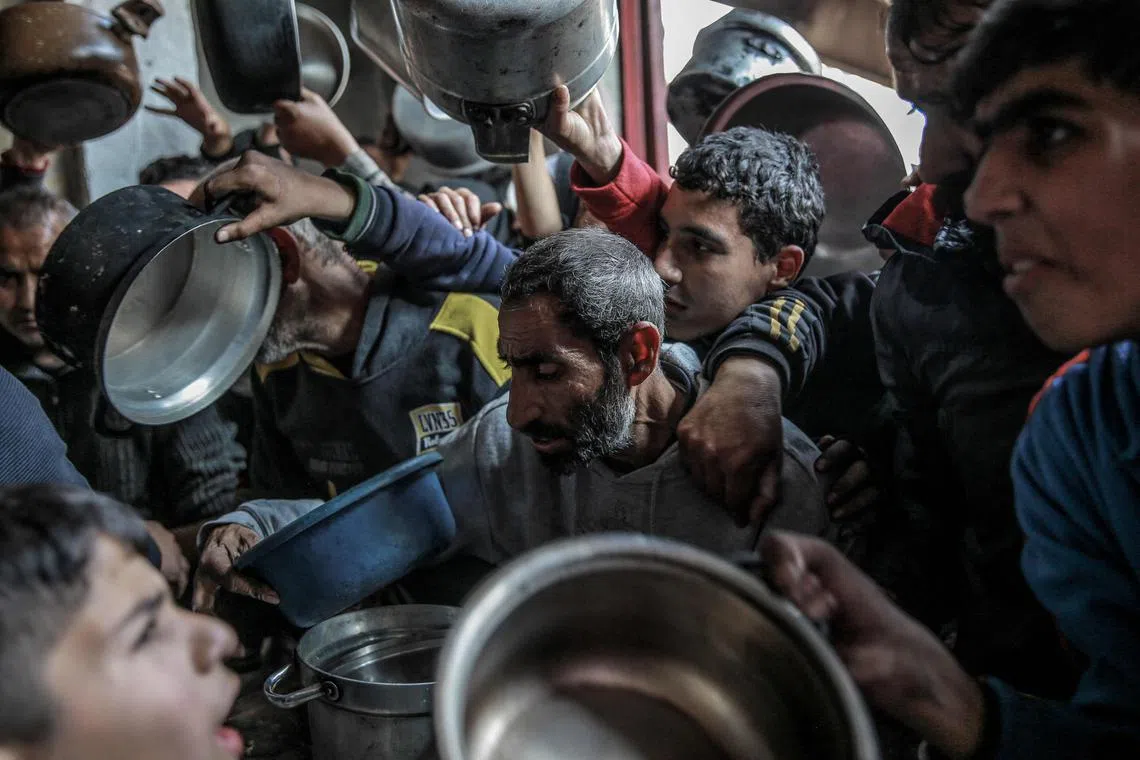Palestinians in Gaza describe struggle to find food amid fears of situation worsening
Sign up now: Get ST's newsletters delivered to your inbox

As famine looms over Gaza’s 2.2 million people, their tenuous survival has become a little harder for many this week.
PHOTO: AFP
Follow topic:
GAZA CITY - On most mornings before the war, bodybuilder Suhail Al-Asaad could be found at his kitchen counter in Gaza City, Gaza Strip, eating an omelette of eight egg whites before speed-walking along the waterfront and heading to the gym to lift weights.
That waterfront now lies in ruins.
Mr Al-Asaad and his family, like so many others, were displaced from their home by Israel’s intense bombardment and invasion and now sleep in a tent in Rafah, in southern Gaza. He spends his days struggling to find food for himself, his wife, their three children and his sick mother.
Breakfast, of any kind, is elusive. Eggs are a luxury.
As famine looms over Gaza’s 2.2 million people, their tenuous survival has become a little harder for many this week.
World Central Kitchen, the charity founded by chef Jose Andres, suspended its relief efforts there after seven of its workers were killed in Israeli air strikes on April 1
Since the start of the war in Gaza in October 2023, the aid group said, it had delivered more than 43 million meals there.
Mr Al-Asaad knows many people who relied on meals from World Central Kitchen, which often consisted of rice and beans and sometimes meat or chicken.
His family rarely got the meals “because the demand was more than the supply”, Mr Al-Asaad said in an interview on April 5.
Those who received them regularly, he added, would struggle to find a replacement.
Under pressure from US President Joe Biden, Israel has agreed to open more routes for aid convoys, but it remains unclear when that might happen.
Aid agencies and multiple nations say they are working to supply more food through the two southern border crossings that have been in use, but some Palestinians in Gaza doubt it will be enough to meet the enormous need, with many families now getting little or nothing.
“I can’t describe our situation. We are clinging to life, and that’s it,” said Mr Mohammad al-Masri, a 31-year-old accountant who is also sheltering with his family in a tent in Rafah.
“The aid doesn’t always get to those who are displaced, except for very little,” he said on April 5 via WhatsApp. “Mostly it all gets sold in the market,” he added, echoing what many Palestinians in Gaza have said for months.
His family is able to buy some canned meat and vegetables, and get rice and beans from another charity kitchen, he said.
Profiteering and an active black market have made things worse.
In mid-March, Mr Al-Asaad posted a short video on his Instagram page of two eggs – all he could afford – he had just bought at the local market for 10 Israeli shekels, about 10 times what they used to cost.
His family – six people – planned to cook the eggs for that night’s iftar meal, to break the day-long Ramadan fast. “Eggs cost more than gold,” Mr Al-Asaad, 45, wrote in the caption.
Like a growing number of Palestinians in Gaza, he has resorted to making a GoFundMe page seeking donations to buy food and clean water. “We have now entered the sixth month without money, food or even aid, all of which are available on the black market at high prices,” he wrote on the page.
The World Food Programme, an arm of the United Nations, says that famine is imminent in northern Gaza. The number of people in the entire besieged enclave facing catastrophic levels of hunger is now at 1.1 million, according to the group.
The World Health Organisation, also a UN agency, reported this week that at least 27 children had died from malnutrition in Gaza.
April 5 was the last Friday, a holy day for Muslims, during Ramadan.
It would normally be a day of increased religious observance and preparation for the upcoming Eid al-Fitr festivities marking the end of Ramadan. But Mr al-Masri said there was none of that feeling in the tent encampment he was living in with hundreds of thousands of other Palestinians.
“Most people fast because there is nothing to eat anyway,” he said. “We didn’t feel like this was Ramadan. There was no sense of Ramadan this year.” NYTIMES

